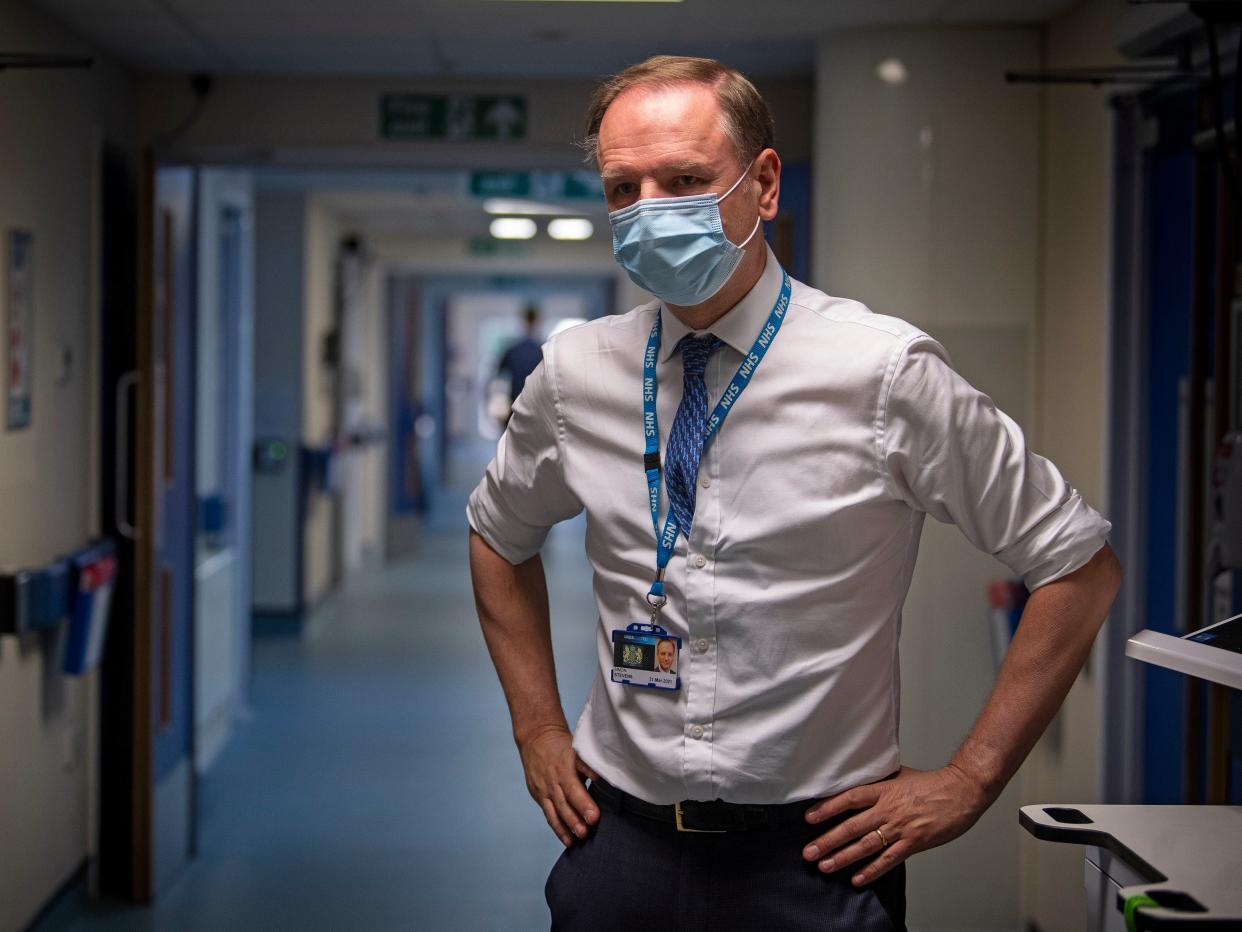NHS England chief warns of ‘disturbing’ coronavirus signs as hospital admissions surge

The chief executive of NHS England has warned the health service will need to be “agile” in its response to “disturbing” increases in coronavirus infection rates and hospital admissions.
Speaking at a virtual conference of NHS leaders Sir Simon Stevens warned the numbers of patients in hospital had increased from a few hundred a month ago to almost 3,000 today.
He told NHS hospital leaders an agile local response would be needed.
His comments come as the latest data showed there were 2,944 Covid-19 patients in hospital in England as of Wednesday, up from 1,958 a week ago, while 376 Covid-19 hospital patients were in intensive care on ventilators to help them breathe, up from 281 a week ago.
A total of 472 patients with confirmed Covid-19 were admitted to hospitals in England on Monday, compared with 308 a week earlier.
Across the UK the death toll increased by 70 in the last 24 hours, bringing the total number of deaths to 42,515.
A further 14,162 lab-confirmed cases of Covid-19 have been recorded in the UK, bringing the total to 554,275. In total more than 58,000 deaths have been registered in the UK.
Each day the NHS is admitting around 450 new patients with Covid-19. The north west and north east and Yorkshire regions are seeing around 200 patients a day being admitted to hospitals.
Sir Simon told NHS bosses that 2020 had “without doubt been the most challenging year in the history of National Health Service”.
His deputy Amanda Pritchard added: “Many of our people, especially frontline staff, are exhausted, and some are traumatised. Many have lost friends, they've lost family, they've lost colleagues. And I think there's a genuine fear about that potentially happening again.”
Sir Simon said it was clear pressures were rising: “Speaking frankly there are disturbing signs that infection rates from coronavirus are, again, rising. They are clearly headed in the wrong direction, not just nationally, but particularly in some regions and local areas across the country.
“At the start of September, we had under 500 coronavirus inpatients in hospitals across England. That is now nearly 3000. And we know that hospital admissions lag community infection by several weeks.”
He said as winter neared the NHS was going to have to be “very agile in our response, not only to coronavirus, but to winter pressures and to sustaining the wider range of services that the NHS offers.”
But Sir Simon, who has been chief executive of NHS England since 2013, said he believed some things had shifted in favour for the health service with new treatments and better knowledge of the disease than in April when predictions had suggested tens of thousands of patients would need ventilators to breathe.
He said: “This time around I think we have a better sense of what the range of demands are that might be placed on the health service. We have new treatments, which have an impact on hospitalisation and severity, and in the case of some of the treatments mortality as well.
“There is this strong regional difference in the infection rates across the country, put those two things together, a sense of what the peak demand might look like plus the regional variation; that tells us the right response is to be very locally, adaptable and agile, in terms of the way in which we handle increasing numbers of coronavirus patients.”
This could mean hospitals pooling resources and helping each other to cope while maintaining as much normal activity as possible.
Sir Simon’s deputy Amanda Pritchard said this was already happening in parts of the north west.
NHS England has also announced £10m to fund a new network of clinics for patients suffering so-called long covid symptoms including chronic fatigue.
In a reference to the growing demands on the NHS and a possible bid for new funding for the NHS Sir Simon said: “We have got new needs that we are going to have to address and will have to be factored into the capacity of the NHS, whether it's long covid, whether it's dealing with the backlog of patients waiting for routine operations, whether it's for some of the psychological and mental health consequences of the pandemic. Those new care needs will need addressing.”
Amanda Pritchard said NHS England was working with Number 10 on a new Health Bill for the NHS which would be presented to Parliament next year.
Sir Simon said the “backbone of the bill” would be to integrate care and complete the merger of NHS bodies but he added he hoped it would “get rid of some of the bureaucracy that goes with the current procurement rules”.
Asked by The Independent whether NHS England would lose more operational independence to the government he said: “We are taxpayer funded, the government of the day gets to set the funding and the priorities for the NHS, and the precise mechanisms by which that is given effect.
“We wouldn't expect there to be any departure from the principle that the NHS is democratically accountable.”
Read more
Coronavirus and NHS tests hit by delay in Roche supply chain
NHS needs new funding deal to cope beyond Covid, ministers warned
NHS staff reach a breaking point as coronavirus second wave looms

 Yahoo News
Yahoo News 
